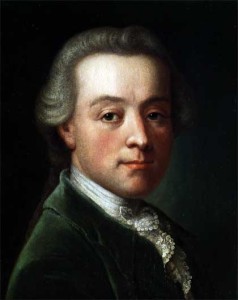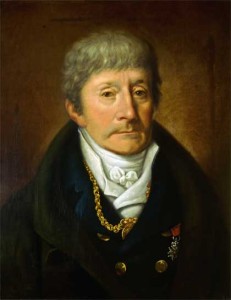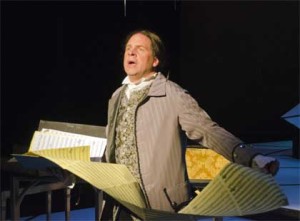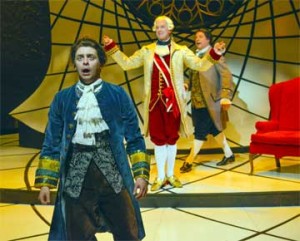Play (1979)
by Peter Shaffer
Directed by Jim Petosa
New Repertory Theatre
Arsenal Center for the Arts
Watertown, MA
April 28 – May 26, 2013
With Benjamin Evett (Salieri), Tim Spears (Amadeus), McCaela Donovan (Constanze), Russell Garrett (Emperor Joseph II), Esme Allen (Katrina), Michael Kaye (Venticelli), Paula Langton (Venticelli), Emily Culver (Teresa Salieri), Paul D. Farwell (Von Strack, Giuseppe Bonno), John Geoffrion (Cook), Nathaniel Gundy (Valet), Evan Sanderson (Van Swieten), Gabriel Rodriguez (Ensemble), Mark Soucy (Ensemble)

Antonio Salieri outlives Mozart by several decades and confronts, in his dotage, the guilt of perhaps having been responsible for Mozart’s death. His bitter recollections of Mozart, recounted and replayed, and the revelation of the depths of his jealousy of Mozart and rage at the God who produced him, drive this ironic psychological treatment to its tragic and withering conclusions.

Those who have seen the well known 1984 film, directed by Milos Forman, of this notable play will be familiar with its basic trajectory. That film includes notable portrayals of Salieri by F. Murray Abraham and of Mozart by Tom Hulce which, in some ways, are so well known and iconic that it is hard, if one is familiar with them, to separate them from other renditions.
Ben Evett creates a magnetically desperate portrayal of Salieri that is less overtly sinister than Abraham’s while maintaining high levels of sardonically gleeful instability. One easily envisions Abraham’s Salieri as a kind of devilish assassin, which potentially leaves a bit of the mystery out of the narrative. Of course, the tension of the drama rides on the uncertainty about whether Salieri actually did kill Mozart or only as an old man raved about having done so. Evett’s Salieri exhibits a healthy amount of rage, but there is enough delusional and self-punishing complexity in the portrayal to make one believe that Salieri might have been crazy enough to think he killed Mozart without actually having done it. Evett’s distinctive combination of smirking defiance of providence and devastated desperation at its loss makes a compelling argument for Salieri’s self-destructive self-deception.

in “Amadeus”
Photo: Andrew Brilliant/Brilliant Pictures
Courtesy New Repertory Theatre
The play is quite long – about three hours – and, though interesting, it seems like it might benefit from a bit of abbreviation. There is, in Salieri’s repeated rants against the Almighty, a kind of Johnny-one-noteness that gets across without the need for so much repetition. This is a minor shortcoming of the play itself, but not of this production, which does a very good job of moving things along.
As Mozart, Tim Spears provides a characterization which is, in some ways, easy to identify with Hulce’s at the outset, but which grows in distinctiveness as the evening rolls along. By the end, one sees in Spears’ performance the vivid sadness of Mozart’s poverty and isolation, and the curious combination of genius and impracticality that spells his end.
The supplementary roles are well played. In particular, McCaela Donovan, a striking young actress who has made her presence felt on the Boston theater scene over the past couple of years, does a saucily sympathetic turn as Mozart’s wife, Constanze. Her dark glamour and gaminelike adroitness make her a delightful comic counterpart to Spears’ Mozart; and she can adeptly carry the drama when necessary.

Russell Garrett as Emperor Joseph II
Benjamin Evett as Antonio Salieri
in “Amadeus”
Photo: Andrew Brilliant/Brilliant Pictures
Courtesy New Repertory Theatre
Paula Langton, as one of the two Venticelli, provides a running commentary in the earthy wench mode, adding a welcome touch of Sweeney Todd-ness to the mix. Russell Garrett is a delightfully benevolent and inane Emperor Joseph II. And Esme Allen, another young actress who has provided a lively and compelling presence around the Boston theatre scene recently, makes a somewhat wordless, but coyly appealing, show as Katrina, vocal and passionate focus for both Salieri and Mozart.
One of the engaging enhancements of the play is its casually insightful way of assessing, in passing, the symbolic elements in Mozart’s operas. Identifying the two sisters, Dorabella and Fiordiligi in Così Fan Tutte as inspired by the two sisters Mozart was enamored of, Constanze and Aloysia Weber, or seeing and highlighting the starkly contrasting paternal representations in Don Giovanni and The Magic Flute, are concisely and beautifully articulated insights.
– BADMan
Leave a Reply